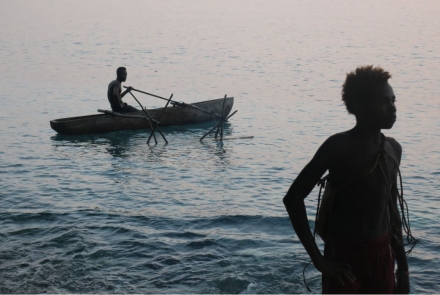
Photo by Ben Bohane, ANU
Pacific Wayfinder: The Pacific’s transnational black markets
As transnational crime grows in the Pacific, Pacific governments and regional partners must invest in a unified strategy to combat it, Ben Bohane writes.
There was a time when the Pacific islands were largely untouched by global criminal groups and local police dealt mostly with petty crime.
Then in the 1980s and 1990s, global drug syndicates began exploiting the soft maritime borders of Pacific islands as places to quietly import and stockpile drugs before shipping them down, in small batches via airline ‘mules’ or yachts, to the lucrative Australia and New Zealand markets.
Asian drug syndicates also targeted New Caledonia as a transshipment point as its domestic flights to France allowed, for a while, a cunning, back-door route to getting drugs into Europe.
Syndicate strategy back then was not to create a local market in the islands so as to keep their smuggling hidden from general view – after all, it wasn’t worth getting detected in the islands for such a small local market.
These days the situation has changed, along with the types of drugs. In recent years there has been a string of big drug busts from Vanuatu to Fiji to Tonga, and there are signs that international cartels are working more and more with local gangs and facilitators.
While heroin and cocaine continue to be smuggled through the islands en route to Australia, a major concern among law enforcement is the amount of crystal methamphetamine, colloquially known as ‘ice’, turning up in local markets and the devastating impact it is having on local communities.
In Tonga, one prominent social worker and anti-drug crusader was murdered recently, after warning that “this is the fight of our generation”. Transnational crime in all its facets – not just drugs – was identified as one of the reasons behind the creation of the Boe Declaration on Regional Security, developed by the Pacific Islands Forum.
“Transnational crime is one of the most serious security issues facing the Pacific Islands region and it was identified as one of the four key challenges by the Pacific Islands Forum,” said Jose Sousa Santos, an expert on Pacific transnational crime, on the Pacific Wayfinder podcast.
“Over the past two decades, the Pacific has seen a significant increase in the trafficking of methamphetamines, cocaine, and precursors. Increased connectivity within and across the Pacific has enhanced economic opportunities, but also exacerbated the Pacific’s vulnerabilities. Islands have become a production site and trafficking destination, as well as trafficking thoroughfare.”
Tevita Tupou is a senior lecturer at the University of the South Pacific in Fiji with a background in customs, immigration and policing. He’s worried Fiji is becoming a hub for drugs and criminal groups.
“We are struggling with the issue of drugs,” he said, claiming it is no longer about some youths consuming marijuana like before, but about gangs with international connections producing and distributing synthetic drugs locally.
The COVID-19 crisis has pushed more people in the region into poverty, which may make them more susceptible to temptation, and the criminal networks behind drugs, according to Tevita.
“20 per cent of our people live in informal settlements which can be a breeding ground for this kind of thing, and COVID has put that on steroids. Call it a challenge, but it is also an opportunity for government to take a more holistic approach.”
Jose suggested that between 30-40 per cent of mental health admissions to hospital in Tonga stem from drug-related issues and the system is barely coping. Groups like the Salvation Army are stepping in to provide counselling and recovery services, but they have limited resources. Pacific governments need to invest more in an overarching strategy that combines law enforcement, health officials, and church and community leaders.
Apart from drugs, other transnational crime issues include human trafficking, money laundering and wildlife smuggling. The deportation of Pacific youth from the United States, Australia and New Zealand due to criminal behaviour is exacerbating the problem as there is little local support for their integration into island communities and they end up often ‘professionalising’ local gangs.
There is also concern that criminal syndicates are increasingly moving into legitimate businesses to cover their shady past or present activities.
“Criminal syndicates sometimes piggyback on legitimate commercial interests, for example from China and Southeast Asia, to Pacific Island states,” Jose said.
“Once they’re able to enter and become established in Pacific Island countries, the impact they can have on society – being a hybrid of a legitimate entity and being backed and controlled by a criminal entity – gives them an agility that is difficult for law enforcement to actually target.”
There are geopolitical implications when countries don’t make information available to island police about criminal connections to legitimate foreign businesses operating in island nations, which have the potential to influence local business and political elites.
Tackling transnational crime in the region is an ongoing challenge, and greater cooperation between island states is needed, while larger players like Australia and New Zealand need to allow their Pacific partners to take the lead.
This article is from our Pacific Wayfinder series, bringing you voices from the Pacific Island region. It is produced in conjunction with the Pacific Wayfinder podcast, produced by the Australia Pacific Security College.
Updated: 1 July 2024/Responsible Officer: Crawford Engagement/Page Contact: CAP Web Team












